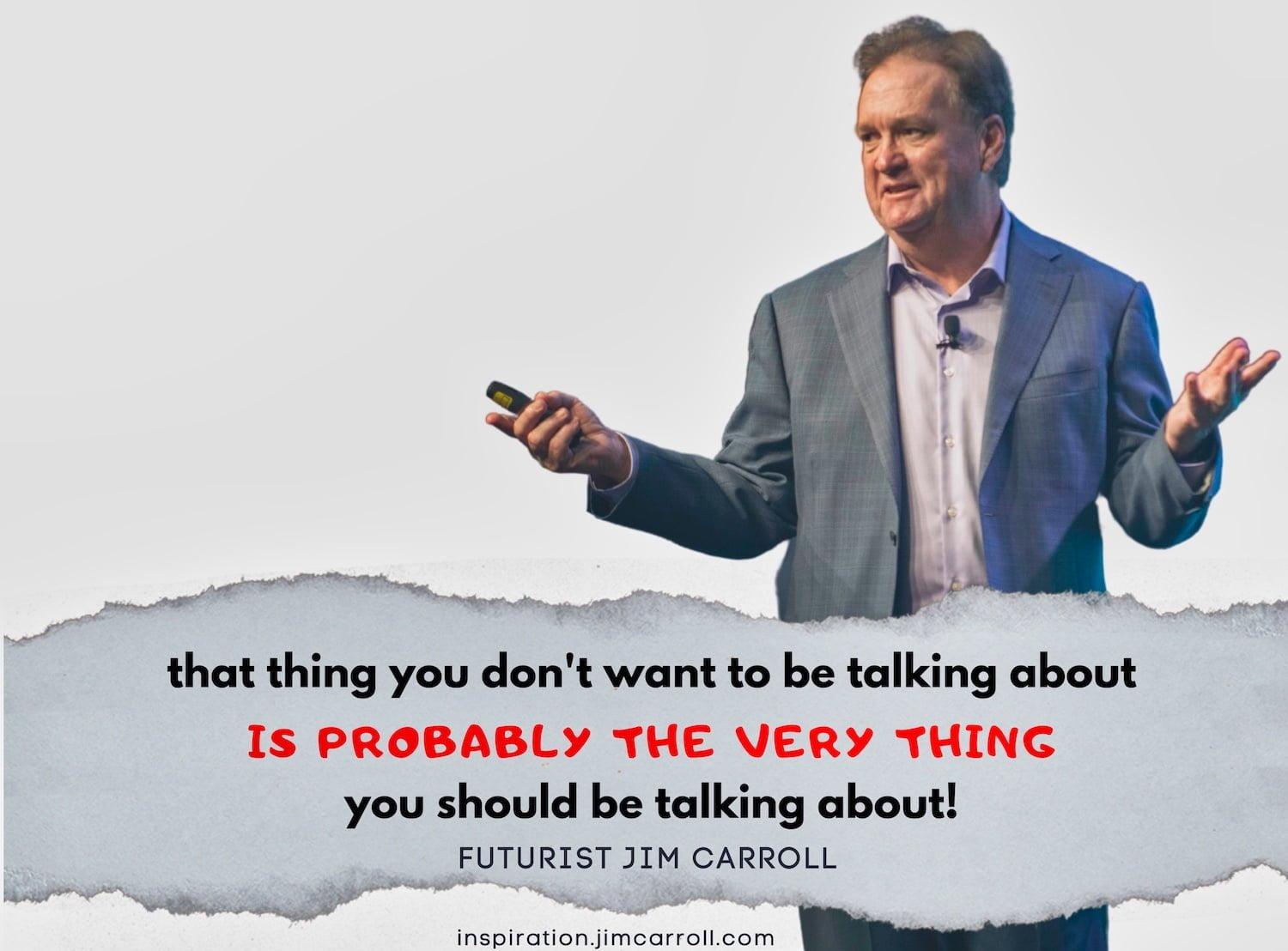“That thing you don’t want to be talking about is probably the very thing you should be talking about!” – Futurist Jim Carroll

I’ve struck a chord with my recent posts about leaders who don’t want to acknowledge their competitors, and then, the critical concept of enhancing your competitive intelligence. I mentioned to one individual a bit of feedback that when I’m asked not to mention a particular company in my slide deck, I’m also often given a bit of a list of other things not to cover. I call it the ‘no-go’ list. Often, the list because a concise summary of everything I see wrong with the organization – which makes for a bit of an awkward pivot and skate during my talk!
But think about that – how many companies and the leaders who lead them have a number of topics or issue that they dare not speak about during the regular course of business? Or how about those corporate organizations you encounter that have a corporate culture that refuses to acknowledge or even discuss some of the deep problems that are holding back their potential – or worse yet, dooming them to irrelevancy?
it’s easy to compile a list of the types of things that many companies dare never speak about, mention, or focus upon:
- negative customer feedback
- negative customer reviews
- public relations blowups and forced errors that result in perception damage
- any sort of product or service failure
- any sort of corporate mistake
- the successful activities of the rebels in the organization
- workplace conflict issues
- previous efforts at innovation that failed
- critical trends that will cause significant change and yet cause distress
Often, the attitude that is often found is that it is best to keep these things hidden rather than confronting them, acknowledging them, and fixing them. The result is a sort of corporate rot that sets in.
The problem is most acute when this sort of denial settles in at the level of senior management – or worse yet, the CEO. I’ve got a big stack of research papers on my desk that I’m going through for an upcoming post on the warning signs and dangers of CEO arrogance – but here’s a bit of a replay of a previous post that focused on the issue. Think about the story here – and ask yourself, does the denial of potential business model disruption not indicate a deep, systemic leadership failure?
Quote: “Arrogance, hubris, infallibility, overconfidence – if these words are in your attitude inventory, you have a pretty big problem!” – Futurist Jim Carroll

I’ve met some interesting people along the way, and have found myself in some interesting situations.
I often encounter senior executives who carry with them a stunning complacency about their place in the world – a belief that nothing will threaten or challenge them. They might have a great future, perhaps, at Blockbuster, Sears, Kodak, or others….. I don’t think we have ever lived in a time that has involved so many trends coming together that have such a potentially disruptive impact, and no organization is guaranteed success based on what it has done so far – it can only hope to innovate and change enough to adapt to what comes next. Yet I meet some CEOs who believe that rule won’t apply to them. Arrogance is a dangerous thing.
Personal infallibility is also a risky mindset. We are all only one step away from disaster at any given time – the decisions we make every moment guide us into our personal future. Clarity of mind and clarity of purpose are the rules that should guide us day by day!
Because if you can’t talk about the things that need to be fixed, you’ll never fix them!




GET IN TOUCH
Jim's Facebook page
You'll find Jim's latest videos on Youtube
Mastodon. What's on Jim's mind? Check his feed!
LinkedIn - reach out to Jim for a professional connection!
Flickr! Get inspired! A massive archive of all of Jim's daily inspirational quotes!
Instagram - the home for Jim's motivational mind!